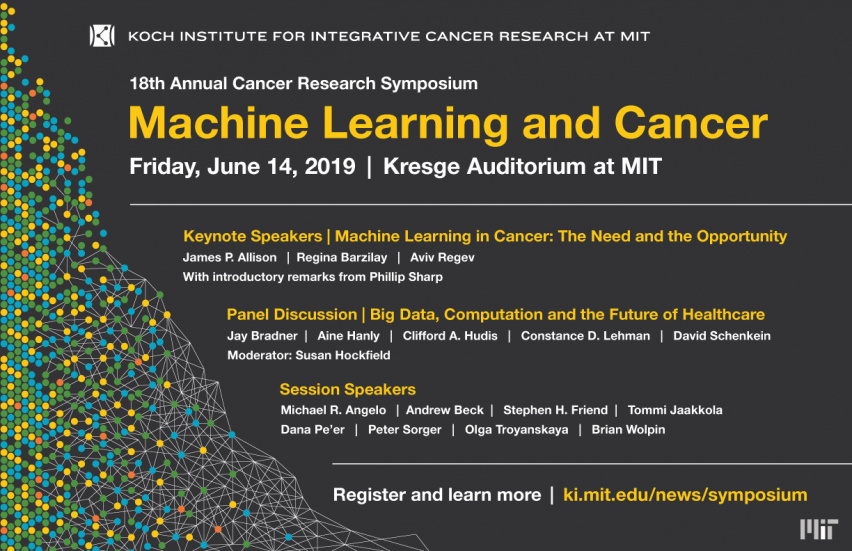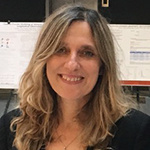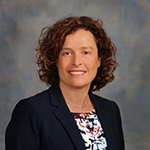
The 18th Annual Koch Institute Summer Symposium on June 14, 2019 at MIT's Kresge Auditorium will focus on "Machine Learning and Cancer."
Both fields are undergoing dramatic changes, and their integration holds great promise for cancer research, diagnostics, and therapeutics. Cancer treatment and research have advanced rapidly with an increasing reliance on data-driven decisions. The volume, complexity, and diversity of research and clinical data—from genomics and single-cell molecular and image-based profiles to histopathology, clinical imaging, and medical records—far surpasses the capacity of individual scientists and physicians. However, they offer a remarkable opportunity to new approaches for data science and machine learning to provide holistic and intelligible interpretations to trained experts and patients alike. These advances will make it possible to provide far better diagnostics, discover possible chemical pathways for de novo synthesis of therapeutic compounds, predict accurately the risk of individuals for development of specific cancers years before metastatic spread, and determine the combination of agents that will stimulate immune rejection of a tumor or selectively induce the death of all cells in a tumor.
Agenda
Introductory Remarks
Tyler Jacks, PhD
Koch Institute for Integrative Cancer Research at MIT
Phillip Sharp, PhD
Koch Institute for Integrative Cancer Research at MIT
Keynote SpeakersMachine Learning in Cancer Research: The Need and the Opportunity
Moderator: Phillip Sharp, PhD
Koch Institute for Integrative Cancer Research at MIT

Immune checkpoint blockade in cancer therapy: Historical perspective, new opportunities, and prospects for cures
James P. Allison, PhD
MD Anderson Cancer Center

Cell atlases as roadmaps to cancer
Aviv Regev, PhD
Broad Institute, Koch Institute for Integrative Cancer Research at MIT

How machine learning changes cancer research
Regina Barzilay, PhD
MIT Computer Science and Artificial Intelligence Lab, Koch Institute for Integrative Cancer Research at MIT
Session 1 Machine Learning to Deciper Cellular and Molecular Mechanisms in Cancer
Moderator: Matthew Vander Heiden, MD, PhD
Koch Institute for Integrative Cancer Research at MIT

Comprehensive enumeration of immune cells in solid tumors using MIBI
Michael R. Angelo, MD, PhD
Stanford University

Decoding cancer genomes with deep learning
Olga Troyanskaya, PhD
Princeton University

Manifolds underlying plasticity in development, regeneration and cancer
Dana Pe’er, PhD
Memorial Sloan Kettering Cancer Center

Measuring and modeling variability in drug response in cells, tissues and clinical trials
Peter Sorger, PhD
Harvard Medical School
Panel Discussion Big Data, Computation and the Future of Health Care
Moderator: Susan Hockfield, PhD
Koch Institute for Integrative Cancer Research at MIT

James (Jay) Bradner, MD
Novartis

Aine Hanly, PhD
Amgen

Clifford A. Hudis, MD
American Society of Clinical Oncology

Constance D. Lehman, MD, PhD
Massachusetts General Hospital

David Schenkein, MD
GV
Session 2 Machine Learning into the Clinic
Moderator: Sangeeta Bhatia, MD, PhD
Koch Institute for Integrative Cancer Research at MIT

Machine learning for drug design
Tommi Jaakkola, PhD
MIT Computer Science and Artificial Intelligence Lab

Artificial intelligence for pathology: From discovery to AI-powered companion diagnostics
Andrew Beck
PathAI


From complex to complicated problems: What are the known unknowns, and unknown unknowns in using wearables to forecast symptom transitions
Stephen H. Friend, MD, PhD
University of Oxford, 4YouandMe
Closing Remarks
Phillip Sharp, PhD
Koch Institute for Integrative Cancer Research at MIT
Watch video
Thank you to our sponsors
Platinum
Thermo Fisher Scientific
Gold
Bayer
Bristol-Myers Squibb
Dragonfly Therapeutics, Inc.
Skyhawk Therapeutics, Inc.
Silver
Agilent Technologies, Inc.
Alnylam Pharmaceuticals
Sanofi
Takeda Pharmaceuticals
Bronze
Calico Life Sciences LLC
Cell Signaling Technology
With additional support provided by:


